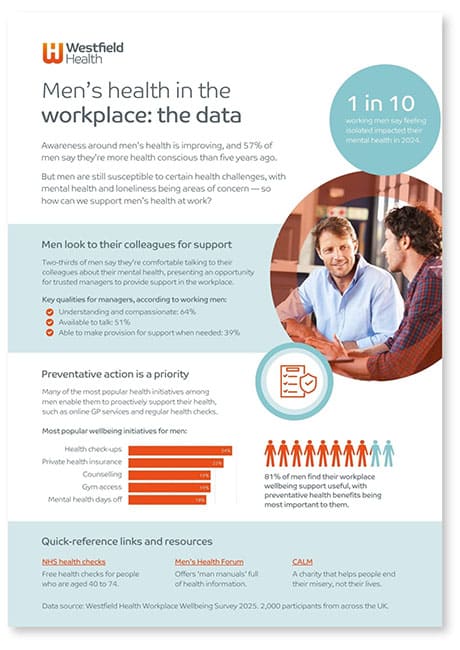When it comes to male mental health, many are more likely to open up to trusted individuals in informal settings than seek professional help. This makes third places—neutral, comfortable environments outside of home and work—essential for emotional support. These places not only help reduce loneliness but also encourage the kind of authentic connection that strengthens mental wellbeing.
By shaping shared values, creating social moments where vulnerability feels safe, or concentrating on community-focused spaces, workplaces can help make it easier for men to speak up, feel supported and stay connected.
The importance of third places for men
Connection is one of Mind’s five ways to wellbeing. Thirds places—the environments outside of work and home—are vital for wellbeing. These are the cafés, gyms, barber shops, walking groups, or community clubs such as Andy’s Man Club where men can be themselves, free from responsibility or expectations.
What makes third places powerful is their neutrality. They’re not tied to roles like “employee,” “partner,” or “parent”—and that emotional freedom makes it easier to open up. When men are in relaxed, comfortable environments, they’re more likely to feel supported and able to form genuine connections. Culturally, this kind of space is essential to countering the pressure many men feel.
How men seek support
A Movember survey found that 40% of 18- to 34-year-olds avoided discussing their struggles out of a fear of coming across as less manly. Men are more likely to open up to trusted people within their personal or professional environments. For example, Gallup’s research shows that employees with a “best friend” at work are seven times more likely to be engaged as it creates more emotional support through comfortability.
Many men avoid seeking help from therapists or mental health professionals due to societal expectations, discomfort discussing personal issues, and feelings of embarrassment or shame. However, more than half of men would be happy to open up if they knew it could lead to better healthcare or help others. Creating these “in-between” spaces can be a powerful tool in supporting men’s mental health and building emotional support from peers.
The loneliness epidemic
A study by the Royal Voluntary Service found that 35% men feel lonely at least once a week, while 11% feel lonely on a daily basis. Loneliness remains a growing issue in men’s mental health—especially in today’s hybrid and digital workplaces. For men, social connection at work can be harder to access due to lingering stigma around vulnerability. Workplaces that create comfortable, inclusive environments help shift this. When men feel safe, supported, and able to connect authentically, isolation decreases—and both wellbeing and performance improve.
Often, all it takes is someone being vulnerable first to make others feel able to do the same. These small acts help men feel seen and supported, making isolation less likely and work more meaningful. This can take mean line managers being more open in one-to-ones, colleagues taking time to arrange social activities together or taking the first step towards joining a third space community.
Here are some ways to support mental health and encourage wellbeing so employees feel more connected:
- Incorporate wellbeing check-ins
- Train your line managers in how to have open conversations
- Encourage senior leadership to model openness
- Use anonymous feedback to understand hidden struggles
- Arrange remote or in-person social opportunities
- Tailor your approach to reach those who might feel isolated
- Promote peer support networks
Download our free men’s health data
This free PDF guide provides up-to-date data on men’s health along with practical tips for promoting wellbeing in the workplace. It also includes quick-access links to free health checks and useful resources.
